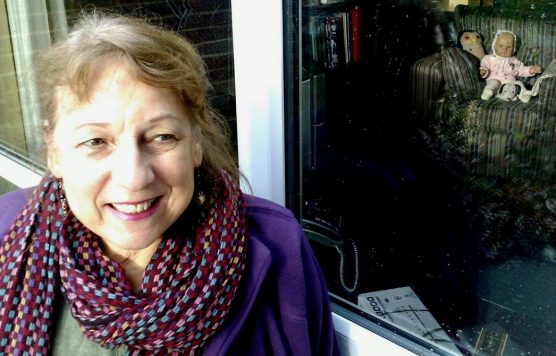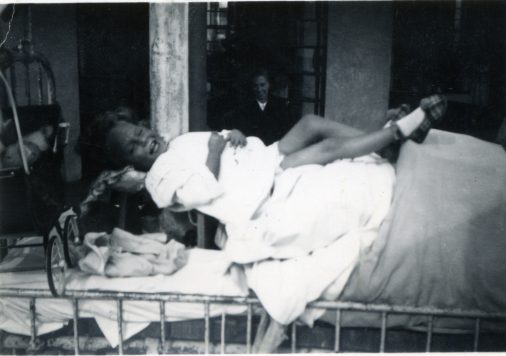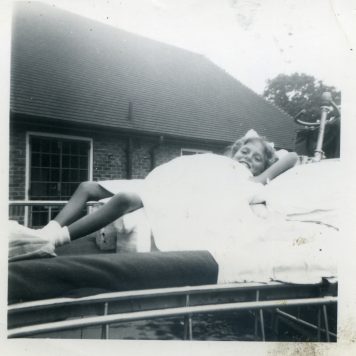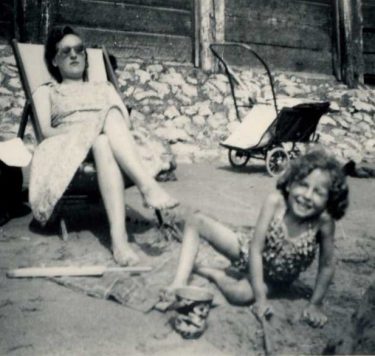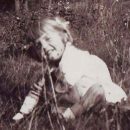Time in Hospital
Deborah Sowerby: Interventions
Deborah was born in 1949 in London. She spent some time in hospital as a young child and then was sent to a residential special school in East Sussex at the age of five, staying there until she was sixteen and then going on to Art School.
Here Deborah talks about her days on the hospital wing of her residential school.
https://howwasschool.allfie.org.uk/wp-content/uploads/2013/06/interventions.mp3
Really and truly my body didn't belong to me. It was of interest to others and I got used to being constantly prodded and poked, and plastered and injected and x-rayed, and blood taken, you know, that was a constant part of my life which you know, it was a question of 'well okay, here's my body, you do that, meanwhile I'm going to look out the window and be somewhere else'. That was how I coped with it.
So I was constantly going to be measured, and fitted, and then I had to wear this most appalling contraption, which was heavy, it was hot, none of my clothes fitted me, and I just wanted to die, I just wanted everything to just stop, and I was petrified, I felt unhappy, I was distraught about what was going on but I didn't seem to be able to stop it, and nobody talked to me about it. So it was 'here you are, you've got to wear this again', and basically, my life for the best part of the year was was concentrated on not wearing this thing. So I was constantly being chased up by the medical staff for wearing this thing - 'no you've got to wear it!' I would wear it in the morning, I would go to school I would take it off I would hide it in a cupboard, and then at the end of school I would put it on again.
Transcript
I guess as much as they were able it was about giving an equivalent to a classroom based education, but it happened on a hospital ward and most of us were in our beds - well I was certainly in my bed. And in fact, not only was I in bed, I was lying flat on my back and I couldn't sit up for a good two and half years. So everything was done lying down with this strange contraption over my bed which involved a, sort of a, like a book stand, and a mirror so that I could see what was going on around me, so I would do everything lying down, looking upwards.Really and truly my body didn't belong to me. It was of interest to others and I got used to being constantly prodded and poked, and plastered and injected and x-rayed, and blood taken, you know, that was a constant part of my life which you know, it was a question of 'well okay, here's my body, you do that, meanwhile I'm going to look out the window and be somewhere else'. That was how I coped with it.
So I was constantly going to be measured, and fitted, and then I had to wear this most appalling contraption, which was heavy, it was hot, none of my clothes fitted me, and I just wanted to die, I just wanted everything to just stop, and I was petrified, I felt unhappy, I was distraught about what was going on but I didn't seem to be able to stop it, and nobody talked to me about it. So it was 'here you are, you've got to wear this again', and basically, my life for the best part of the year was was concentrated on not wearing this thing. So I was constantly being chased up by the medical staff for wearing this thing - 'no you've got to wear it!' I would wear it in the morning, I would go to school I would take it off I would hide it in a cupboard, and then at the end of school I would put it on again.
Explore more
Explore stories by theme or view the timeline of significant events in education for disabled people
![How Was School? [logo]](https://howwasschool.allfie.org.uk/wp-content/themes/hws-base-theme/assets/img/allfie-logo-original.svg)
